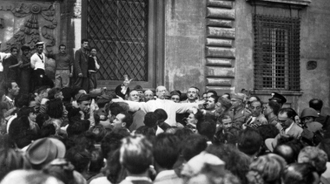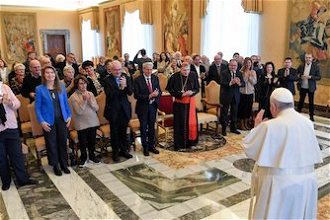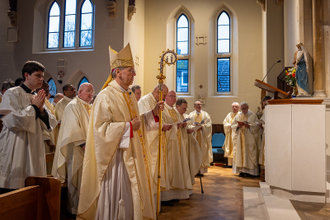Pope Francis: Pius XII archives to open next year

Ven Pope Pius XII addresses citizens during bombing of Rome (16 May 1943 - 5 June 1944)
Source: Vatican Media
Pope Francis has announced that documents relating to Pius XII in the Vatican Secret Archives, will be opened next year. In an address to managers and staff of the Archives, on the 80th anniversary of the election of Pius XII as Bishop of Rome, Pope Francis said that Pius "guided the Barque of Peter in one of the saddest and darkest moments of the twentieth century." The figure of Pius XII, he said, "has already been investigated and studied", and widely discussed and even criticised - at times in a prejudiced or exaggerated manner. Today, he said, the pontificate of Pius XII is being re-evaluated, in the hopes that a more balanced historical judgement might emerge.
Pope Francis thanked the Vatican archivists for the hard work they have undertaken since 2006 to make a careful inventory of the materials on Pope Pius XII, and to prepare to make them available for consultation. Archival work "cultivates memory", he said. "In a certain sense… it could be compared to the cultivation of a majestic tree, whose branches reach to the heavens, but whose roots are solidly anchored in the earth". If the Church is like the tree, the archivists work to keep its historical roots alive, so that "even the greenest and youngest branches can draw from them good sap for further growth".
In announcing the opening of the archives for the pontificate of Pius XII, Pope Francis said he made the decision "with a serene and confident soul, certain that serious and objective historical research will be able to evaluate it in its proper light." "The Church is not afraid of history," Pope Francis said. "On the contrary, she loves it, and desires to love it more and better, as God loves it."
The archive relating to the pontificate of Pope Pius XII, will be opened on 2 March 2020. From this time, qualified researchers will be able to view a large volume of documents collected in the Vatican during the period from 2 March 1939 to 9 October 1958. The date of the opening in 2020 coincides with the anniversary of the election of Eugenio Pacelli as Pope Pius XII.
In an article in today's L'Osservatore Romano, Bishop Sergio Pagano, Prefect of the Vatican Secret Archives, said Pope Francis' decision to open the archives will allow a more profound evaluation of the figure of Eugenio Pacelli, who is often the subject of "superficial criticisms".
In the article, Bishop Pagano describes the long period of preparation that led to this moment: "Archivists of the Vatican Secret Archives and their colleagues from other Vatican archives carried out patient work of sorting, annotating and inventorying the many documents," he writes.
The Prefect recalled that, in 2004, Pope Saint John Paul II made the extensive collection of the Vatican Office of Information for Prisoners of War (1939-1947) available to researchers. This is composed of "2,349 archival units, divided into 556 envelopes, 108 registers and 1,685 boxes of documentation, with an alphabetical file, which amounts to about two million and 100,000 records, relating to military and civilian prisoners, missing or interned, of whom information was being sought. This collection is still very much in demand today by private scholars or relatives of the deceased prisoners," writes Bishop Pagano.
When the archive relating to the pontificate of Pope Pius XI (1922-1939) was opened in 2006, at the request of Pope Benedict XVI, continues the Prefect, "work was already underway for the progressive preparation of the documentary material of Pius XII, which many scholars demanded with ever greater insistence."
Describing the new sources of the Secret Archives that will be available to scholars, Bishop Pagano cites about 151,000 sets of documents (each of which consists of dozens of sheets) of the Secretariat of State. Detailed computer descriptions of this documentation have been prepared and are available in paper format (68 volumes of indexes). Then there are the so-called "separate envelopes", which contain documentation regarding individual topics or institutions, under the organisation of the Secretariat of State, totalling "538 envelopes, of which there will be a precise descriptive list", said the Prefect.
From the same source come the "76 units now called the Pius XII Papers, which contain manuscripts by Eugenio Pacelli before and during his pontificate, as well as typescripts of his many speeches, sometimes with handwritten corrections." There are also three other substantial "special" archival collections. The first is that of the Relief Commission, the second is simply called Pontifical Charity, and the third is that of the Migration Office, set up to deal with the problem of the repatriation of prisoners and refugees, as well as the growing issue of migration, caused by the poverty experienced in certain European countries.
The documents of the pontifical representations will also be available: "For each pontifical representation an accurate Inventory has been prepared, indispensable guides for researchers (about 81 Indexes for a total of more than 5,100 envelopes). These inventories can also be consulted on the Intranet of the Vatican Archives for the convenience of scholars and to facilitate their research in various fields," writes Bishop Pagano.
This huge undertaking was carried out by twenty officials from the Vatican Archives working full-time and exclusively on the project. Where possible, they were assisted by qualified graduates from the School of Palaeography, Diplomacy and Archiving within the Archive itself.
"It was certainly a struggle, but a struggle sustained by a certain enthusiasm, both because we were aware that we were working for future historical research in relation to a crucial period for the Church and for the world, and because the papers were everything but uninspiring. They spoke, and I hope they will speak, to researchers and historians of an almost superhuman work of Christian "humanism" that was active in the stormy disorder of those events that in the mid-twentieth century seemed determined to annihilate the very notion of human civilisation."
The figure of Pope Pius XII has often been "too superficially judged and criticised for some aspects of his pontificate," concluded Bishop Pagan. Now, thanks to the openness asked for by Pope Francis, historians will be able to research the pontificate of Pope Pius XII "without prejudice, but with the help of new documents, in all the realistic scope and richness" of that pontificate.
Research in the Archivio Segreto Vaticano is free of charge and open to qualified scholars conducting scientific studies. All researchers must have a university degree (five-year course) or an equivalent university diploma. Clergymen must possess a licentiate degree or PhD.
A letter of request must be addressed to the Prefect, indicating the reasons for the research. This must be accompanied by a presentation letter from a recognised institute of scientific and historical research or a person qualified in the field of historical research (tenured university professors).
Instructions for conducting research in the Vatican Secret Archives, are available on the website: http://asv.vatican.va/content/archiviosegretovaticano/en/consultazione/accesso-e-consultazione.html .

















